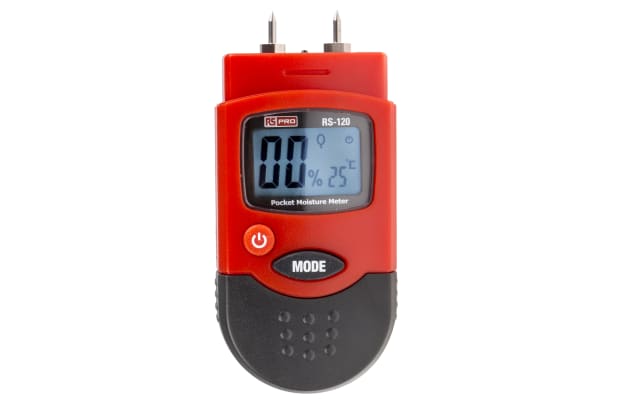Moisture Meter Purchasing Overview: What to Try to find in High-Quality Instruments
Wiki Article
The Ultimate Overview to Wetness Meters: A Comprehensive Review and Just How They Can Conserve You Money
In the realm of structure maintenance, building, and different markets, the importance of accurately gauging wetness levels can not be overemphasized. Wetness meters work as essential devices in identifying and checking moisture material in materials, aiding in stopping costly problems and making sure the top quality of products. Understanding the subtleties of different sorts of dampness meters, their applications, and the prospective cost-saving advantages they offer can be a game-changer for experts and organizations alike. Finding exactly how these gadgets can not only simplify processes however also add to economic savings is a journey worth starting.Kinds Of Moisture Meters
One typical type is the pin-type wetness meter, which gauges the electric resistance between two pins put into a product. Pinless dampness meters, on the other hand, use electromagnetic sensor plates to scan a larger location without creating damages to the product's surface.
Additionally, there are also specialized wetness meters designed for details materials like hay, soil, or grain. These meters provide precise wetness analyses tailored to the unique homes of the material being checked. Infrared wetness meters determine the thermal residential or commercial properties of a product to identify its dampness material non-invasively, making them useful for applications where pin or pinless meters might not appropriate. Understanding the different kinds of moisture meters readily available can aid markets pick the most proper tool for their certain dampness measurement demands.

Advantages of Using Dampness Meters
Dampness meters offer vital benefits in precisely evaluating and checking dampness degrees in diverse materials and environments. One of the key advantages of using moisture meters is the avoidance of prospective damage created by excess wetness.
In addition, making use of wetness meters can result in increased power effectiveness. By identifying locations with high dampness levels, such as leakages or bad insulation, modifications can be made to improve power conservation and reduce energy expenses. In agricultural setups, moisture meters play an important role in optimizing plant yields by making it possible for farmers to check dirt wetness degrees and make informed irrigation choices. Generally, the benefits of making use of moisture meters span throughout various sectors, offering cost-effective options and promoting better top quality control techniques.
Just How to Choose the Right Wetness Meter
When picking a wetness meter, it's vital to guarantee that the meter is suitable for the details product you will be testing. Various products have varying electric properties that can influence wetness readings, so choosing a meter designed for your product is important for accurate outcomes. By very carefully examining these aspects, you can pick a dampness meter that satisfies your demands and supplies exact moisture measurements for your jobs.Appropriate Strategies for Wetness Meter Use

Cost Cost Savings Through Moisture Meter Applications
Just how can the critical usage of moisture meters lead to considerable price savings across numerous markets? In the agriculture market, moisture meters help in identifying the optimum time for gathering plants, stopping over-drying or excess wetness that can impact the last item's high quality.
In a similar way, in building and construction, wetness meters help stop pricey damages by spotting wetness degrees in building products, such as timber or concrete, which can lead to architectural concerns if not attended to promptly. By determining trouble areas at an early stage, professionals can take corrective measures to prevent extensive repair work or substitutes, inevitably saving time and cash.
Furthermore, in the food processing my company market, dampness meters are important for keeping an eye on item top quality and ensuring conformity with safety and security laws. By accurately measuring wetness material in food, suppliers can protect against perishing, keep freshness, and minimize waste, resulting in considerable price financial savings. On the whole, the strategic application of moisture meters is an important investment that can cause considerable expense decreases and enhanced efficiency across various industries.
Conclusion
In verdict, moisture meters are beneficial devices for determining and finding wetness degrees in different products. By using the right dampness meter and following correct techniques, customers can efficiently prevent expensive problems triggered navigate to this website by excess dampness.Wetness meters serve as indispensable tools in detecting and monitoring moisture material in products, helping in protecting against pricey damages and guaranteeing the quality of items. Infrared dampness meters gauge the thermal properties of a Click This Link material to determine its dampness content non-invasively, making them valuable for applications where pin or pinless meters may not be suitable.Wetness meters use very useful benefits in precisely evaluating and keeping an eye on dampness levels in varied materials and atmospheres. In agricultural settings, moisture meters play a crucial duty in optimizing plant yields by making it possible for farmers to monitor soil moisture degrees and make informed watering decisions.In conclusion, wetness meters are useful tools for gauging and finding wetness degrees in numerous materials.
Report this wiki page